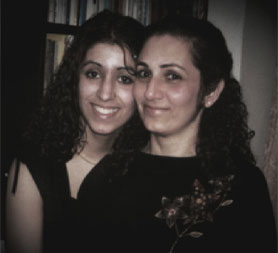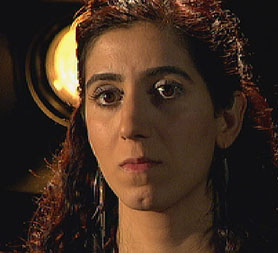July 7 witness: Saba Mozakka
Saba Mozakka’s mother, Behnaz, was killed on the Piccadilly Line as she travelled to work on July 7. Saba tells Channel 4 News speaking at the inquest made sure her mother’s story was told.
Behnaz Mozakka, 47, was travelling to Great Ormond Street Children’s Hospital when she was killed on the London Underground in the London bombings.
Nineteen-year-old Germaine Lindsay detonated his bomb near the rear set of double doors as the packed train they were travelling in left King’s Cross station for Russell Square.
In the most deadly attack on July 7, a total of 26 people died.
Following her death, Mrs Mozakka’s daughter Saba sat on the panel to create a permanent memorial to the victims in London’s Hyde Park, and later gave evidence at the London bombing inquest.
She told Channel 4 News that speaking at the inquest was “about doing my mum justice and making sure that her story was told.”
Click here to return to the London bombings special report and hear from the July 7 witnesses
In a statement originally read at the July 7 inquest, Miss Mozakka remembers her mother and recounts the difficulties that her death caused for their family:
“I am Saba Mozakka, the daughter of Behnaz Mozakka, who was murdered on the Piccadilly Line on 7 July 2005.
“This statement is on behalf of my father, husband of Behnaz Mozakka, Nader, and Saeed Mozakka, my brother, and I.
“The loss of my mother has shattered our family. We miss her every day and life is always incomplete. There is never total joy or happiness, whatever the success or accomplishments that we are toasting.
“Following her murder, we were forced to sell our family home, because the reality of living there without her was too painful to cope with.
“The day we left the family home we had grown up in, the place we had shared so much as a family, was extremely painful. The three of us now live separately, and while we are still very close to the family and love each other dearly, our glue has been taken away from us.”

Nazy’s life
“My mum, Behnaz Mozakka, was known to her family and friends as ‘Nazy’. My mum, Nazy, was born on 18 September in 1957 in Shiraz, Iran. When she was young, she moved with her family to Tehran, where she completed her primary and secondary education. She read biochemistry at the University of Tehran.
“Nazy was the fifth child to her parents. They are an extremely close family and her loss is still deeply felt by her six siblings. They were all absolutely devastated by her death and the consequence on their health has been significant.
“Following the loss of their daughter, Nazy’s mum became extremely unwell and, in fact, never recovered. She died last year after a long period of illness. She often said that losing Nazy made her life unbearable and she gave up any wish of living beyond this.
“My mum and dad met at university. They were students at the same college. They both belonged to a number of sports clubs and soon became very close. They quickly fell in love and decided to marry. They married one term before my mother finished her studies in May 1979. She finished university and began to work at the University College Hospital in Tehran.
“In March 1981, I was born, their first child, and my brother, Saeed, in August 1982. My mother was a fantastic and devoted mum. She loved us more than anything and cherished our family life. I remember clearly that she loved her work in the National Health Service, but her focus was always her family. Raising us gave her much joy and we were very happy.
“In 1991, my mum gave up science in order to spend more time with us as her children. She specifically chose a term-time job in the voluntary sector in order to devote the holidays to Saeed and I. She took up a job at Save the Children working with small children of the gipsy and traveller community. Nazy was immediately very popular at the unit. She became very close to the traveller community and her warmth and compassion was seen by them immediately. She worked there for eight years until the unit lost major funding in 1988.
“She then went back to science and worked at Great Ormond Street Children’s Hospital as a biomedical scientist. My mother thoroughly enjoyed her job and loved her colleagues. She was on the way to this job when she was killed by a bomb on the Piccadilly Line on the transport system.”
Loved by all
“Our mother was extremely active physically and cared a great deal about her charity work. Her favourite charity, Breast Cancer Research, was because a close family member developed breast cancer in her late 30s. My mother regularly fund-raised for this charity as well as participating in sponsored runs and walks. She even organised a run for her colleagues at Great Ormond Street Hospital. She always acted as social secretary for her workmates and, consequently, was at the centre of all the social gatherings. Staff at Great Ormond Street Hospital have described her as ‘the mum of the lab’, and one of her friends from work spoke at her funeral.
“Described as tolerant, hard-working, determined, it was clear that she was loved by all of her colleagues and friends. My mum’s murder has really impacted those that she worked with. Her colleagues from across her working life have kept in contact with our family and constantly reassure us that she is sorely missed at work.

“This is very evident to us from the fact that Great Ormond Street Children’s Hospital made a considerable investment in the creation of a roof garden in her memory for all the staff at the hospital to enjoy. This is a beautiful garden which is a tribute to my mum who loved the outdoors and always felt very passionately that staff did not have enough green space to enjoy during their lunch breaks. The garden prominently features her name and lots of words that colleagues used and chose to describe her.
“My mum was very devoted to us, her family. Born to a large family, she always used her family as her security and the foundation of her well-being. She said nothing gave her more pride than us, her two children. Throughout her family life, nothing was more important than her family. She never thought twice about making sacrifices for her family, and for her love and support we will be forever indebted.”
I crave all that has been taken away
“My mother was incredibly self-confident, always at the centre of any family gathering, whether it was a party or a political meeting. She always brought everyone together and, somehow, you could always hear the sound of her laughter or see her warm smile across the room.
“I, as a woman, cannot imagine ever marrying without my mother being there to share or plan my day. I cannot fathom the idea of having a family without my mother there to support me. As I watch my friends have their own families and develop adult relationships with their mums, I crave all that has been cruelly taken away from me. I was 24 when my mother was murdered.
“It is with the fondest of memories we remember our family life, yet it is with sadness that we have to face the future, whether it is the numerous family holidays the four of us shared, the evening meals we had at home, there is always time that we miss my mum, there will never be a day when we do not miss her.
“We will forever miss her walking through the door in our family home and shouting in her fake American accent ‘Hi, honey, I’m home’. Life in our small family will never be the same because my mother was so cruelly murdered.
“I have worked hard to keep my mother’s memory alive and ensure that she is never forgotten. I worked with the Government on the board of the committee assigned to designing and creating a permanent memorial in London to the victims of the London bombings in Hyde Park.
Memorial
“During a difficult two-year process, I worked as a representative of the bereaved families to create a fitting memorial to those we loved and lost. That was difficult process, but I felt passionately that we had to create a piece that would ensure she would never be forgotten, and all those other victims.
“While I am incredibly proud of what we have managed to achieve, I wished every day, during every single meeting, every single board meeting, that I didn’t have to be involved in this project.
“Following the murder of my mum, I developed post-traumatic stress disorder. The manner of my mum’s death has caused major distress for my family. The horror and brutality of having someone you love so much hurt in this way can never be explained.
“The hundreds of questions we ask ourselves daily, for instance, in such an arbitrary murder, makes the acceptance of our loss extremely difficult, ‘Why her? Why us? Why not a later train? Why that carriage? Did she feel any pain? Could anything have been done to prevent her?’, makes daily life a challenge.
“The loss of our mother and wife has left us with an emptiness that is beyond contemplation. It seems so unjust that our beautiful mother, wife, daughter, sister and friend has been taken away from us in this arbitrary manner. We will never forget all the joy that she brought to those around her.”
